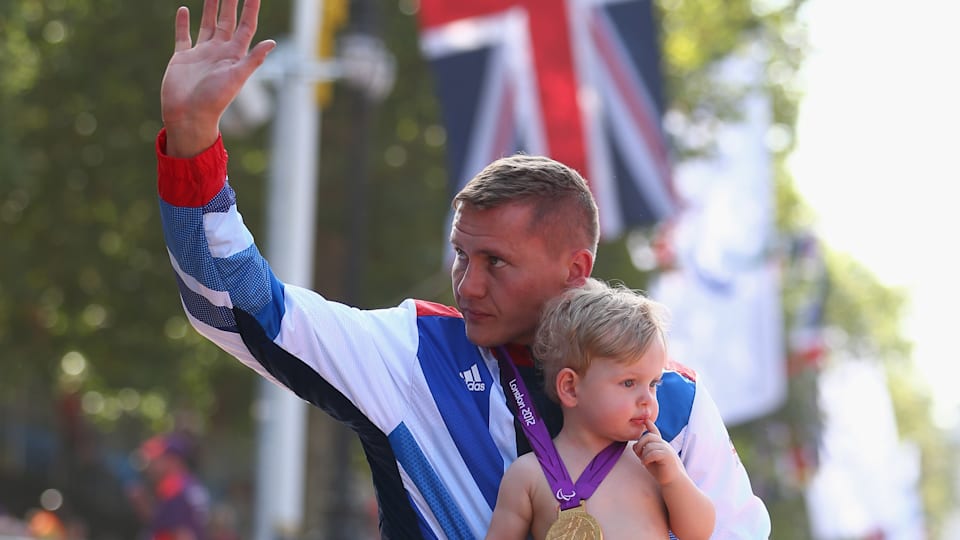
“I was emotionally crying and sitting on the floor and couldn't even talk.”
David Weir is a six-time Paralympic champion but after Rio 2016 he hit rock bottom and went to a series of counselling sessions.
“When I talked about my childhood and being disabled - I said, ‘I used to cry to sleep every night about being disabled.’"
“I used to ask the question, ‘Why? Why did God pick me?’”
The conversations were the start of an emotional journey that the 39-year-old is only just starting to unpack.
From dealing with disability in his childhood to leaving the British Paralympic team after Rio 2016, Weir told the Olympic Channel Podcast that he's finally facing up to an inner turmoil that’s been with him since birth.
LISTEN: The full, exclusive interview with David Weir at Olympic Channel, iTunes, Spotify, Podbean, and Acast.
Atlanta 1996
Weir has never had the use of his legs, after being born with a spinal cord transection.
The sporting options frustrated him at first until he found wheelchair racing.
And he excelled.
One day the phone rang. He was going to Atlanta 1996.
“I remember receiving (that) phone call on my birthday… It was the proudest moment.”
He was 17 and representing his country, but couldn’t see how he and the sport would progress.
“I just didn’t think there was a future in Paralympic sport.”
He admits to being proven wrong after watching Sydney 2000 on the television and decided never to miss another Paralympics.
London 2012
Medals started to roll in – a silver and a bronze at Athens 2004.
He came away from Beijing 2008 a double Paralympic champion with wins in the T54 800m and 1500m.
By the time London 2012 came around, Weir was widely recognised as one of the best wheelchair riders.
He didn’t disappoint the home crowd.
Four gold medals – including three in front of a packed Olympic Stadium.
Filled to its full 80,000 capacity, a huge noise congratulated Weir as they sung ‘God Save the Queen’ together.
“I got more nervous about that than actually getting into my race chair.
“Singing and hearing those people sing - the noise level was truly amazing.
“I'll never forget it.”
But the highs of London were never repeated in that venue.
“I wish I had savoured that moment... And never raced in that stadium again.”
Rio 2016
Going into Rio 2016, Weir wasn’t right. He missed the birth of his fourth child. He couldn’t focus.
He started trying to check the amount of air in his tyres. He was searching for something wrong.
“I think the pressure of success probably did get me down.”
Rio 2016 ended with dispute with a coach from British Athletics over a relay.
Weir came away with no medals. And also turned his back on representing his country.
“I was a bit bitter. (I was) disappointed in myself with things going on in my home life (and) with British Athletics.
“It took me a long time to get over Rio to be honest. It was the first Games since '96 that I didn't come away with a medal. It made me very depressed.”
The Aftermath
His long-time coach Jenny Archer and others noticed that things weren’t right, but it wasn’t until Weir was mid-way through the London Marathon in 2017 that he decided to go public with how he was feeling.
“I knew that i was going to win. So, I didn't know whether to cry (or) laugh. I was trying to keep my emotions in because literally my emotions were everywhere with depression and stuff like that.
“I thought, ‘I am going to tell the media that I have been struggling.’”
It took time but eventually Weir decided to go to some counselling sessions.
Time to talk
“It was probably the worst drive I had ever done, to be honest. I didn't know what to expect.”
He ended up crying and on the floor.
“(The counsellor said), ‘You've had so many emotions and so many things to deal with in your lifetime. Being number one wheelchair racer in the world to winning medals.
“Dealing with your disability when you were younger... relationship breakdowns with your kids’ mother, and stuff like that.
“It's all just built up... and your mind couldn't take it anymore. This is the end result.
"This is you on the floor collapsed crying, emotionally drained, and not knowing what to do with your life.’”
Tokyo 2020?
Talking has given Weir a new vigour for training and for life.
He won the London Marathon again in 2018. This time he felt complete joy.
“I felt like a different person in that race.
“This year's win was special.”
And he’s hopeful of a resolution with the Great Britain team.
“I’ve got a good relationship with (head coach) Paula Dunn.”
So, he messaged her asking if she would consider Weir for the Paralympic marathon if he met the criteria.
“(She said), ‘Obviously, I am going to put your name up for selection as long as you want to be there.”
Weir was keen to impress that he would only go ‘if selected’.
But there could be a recognisable face lining up for GB at Tokyo 2020.
David Weir was this week’s guest on the Olympic Channel Podcast.
Each week we find the biggest athletes and speakers athletes to talk about the Olympics.
